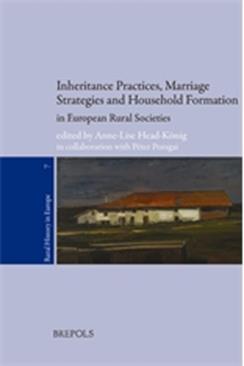Publications | Rural History in Europe
Inheritance Practices, Marriage Strategies and Household Formation in European Rural Societies
Conventional wisdom holds that, over a long period of history, many women and men in the countryside were prevented from marrying because they lacked access to land. This volume offers an up-to-date discussion of the interaction between inheritance practices, marriage and household formation both for those who inherited and those who did not. It asks why and to what extent inheritance patterns and household structures differed between countries and regions in Europe right up to the present day.
Dealing with both impartible and partible inheritance, it examines how retirement practices and choices between ante-mortem or post-mortem property transfers gave rise to a wide range of specific strategies. The chapters cover rural Europe from the seventeenth to the twentieth century, ranging from semi-subsistence and seignorial societies to highly market-oriented economies. They offer case studies drawn from the Iberian Peninsula to Scandinavia and from the British Isles to Russia.
LIST OF CONTRIBUTORS
Rosa CONGOST, University of Girona, Spain
Llorenç FERRER ALÒS, University of Barcelona, Spain
Jane GRAY, National University of Maynooth (NUI), Ireland
Siegfried GRUBER, Max Planck Institute for Demographic Research, Rostock, Germany Switzerland
Anne-Lise HEAD-KÒNIG, University of Geneva, Switzerland
Violetta HIONIDOU, Newcastle University, United Kingdom
Sofia HOLMLUND, Stockholm University, Sweden
Steven KING, University of Leicester, United Kingdom
Herdis KOLLE, Norwegian Centre for International Cooperation in Education (SIU), Norway
Julie MARFANY, Cambridge University, United Kingdom
Richard PAPING, University of Groningen, Netherlands
Ofelia REY CASTELAO, University of Santiago di Compostela, Spain
Alice VELKOVA, Academy of Sciences of the Czech Republic, Czech Republic
 Actualités
Actualités
Les intermédiaires dans la relation de travail dans les sociétés esclavagistes et post-esclavagistes, XVe siècle à nos jours
 Appel à communication - Samedi 1 mars 2025 - 18:00ArgumentaireDans la vaste question du travail contraint et forcé, les intermédiaires, placés à l’intersection des statuts de libre, d’esclave ou d’engagé, jouent un rôle central, quoique relativement négligé par l’historiographie. Ce numéro 'Esclavages & post~esclavages / Slaveries & Post~Slaveries (n°13, 2026, CIRESC), dirigé par Alessandro Stanziani (GRHEN), propose d’exposer leurs situations dans le long terme, du moment de la traite à cel(...)
Appel à communication - Samedi 1 mars 2025 - 18:00ArgumentaireDans la vaste question du travail contraint et forcé, les intermédiaires, placés à l’intersection des statuts de libre, d’esclave ou d’engagé, jouent un rôle central, quoique relativement négligé par l’historiographie. Ce numéro 'Esclavages & post~esclavages / Slaveries & Post~Slaveries (n°13, 2026, CIRESC), dirigé par Alessandro Stanziani (GRHEN), propose d’exposer leurs situations dans le long terme, du moment de la traite à cel(...)
Hugo Souza de Cursi, lauréat de la bourse d'aide à publication de l'IDA 2024
Prix et distinctions -L’ appel à publication de thèses lancé par l’Institut des Amériques (IDA) a vocation, chaque année, à attribuer une aide financière à de jeunes docteurs en sciences humaines et sociales dans le cadre de projets de publication de leur thèse. Les thèses récompensées abordent des thématiques en lien avec les Amériques.Parmi les trois projets retenus dans le cadre de l’appel lancé par l’IDA pour l’année 2024, et soumis à l’acceptation définitive des Presses universitaires d(...)
Prix de la pensée européenne 2024
Prix et distinctions -Le premier prix de la pensée européenne, créé par des intellectuels engagés, a été remis le 16 mars 2024 à Conques, dans l’Aveyron. L’objectif est de promouvoir un idéal démocratique européen qui réponde aux enjeux environnementaux et sociaux du monde.Associé à un colloque de fond "Le réveil de la pensée européenne ?" qui sest déroulé les 16 et 17 mars au Centre européen de Conques (retransmis en direct avec Philosophie Magazine), et présidé par le philosophe Dominique(...)
ERHIMOR
EHESS-CRH
54 boulevard Raspail
75006 Paris
Tél. : +33 (0)1 49 54 24 42
ou : +33 (0)1 49 54 25 74
Fax : +33(0)1 49 54 23 99
Dernière modification :
18/04/2018



